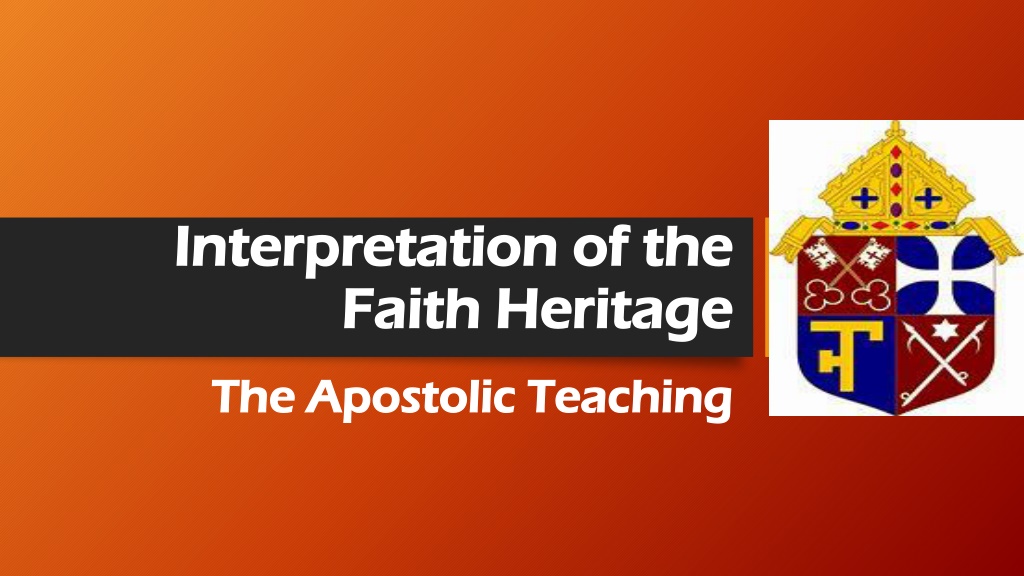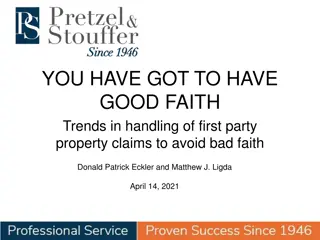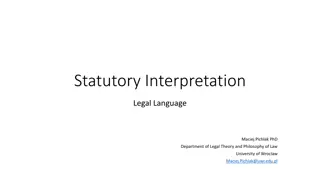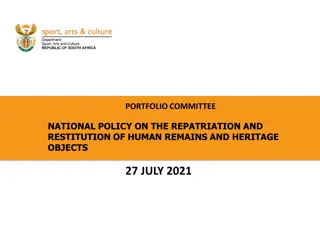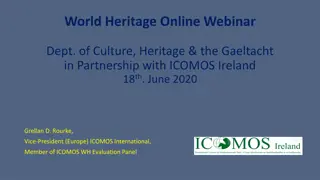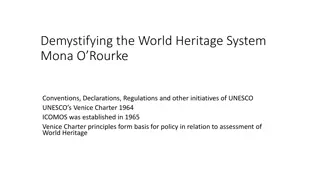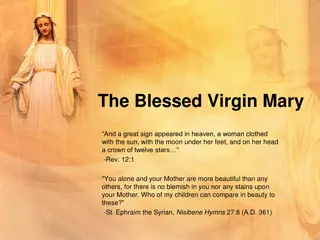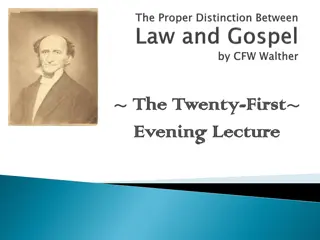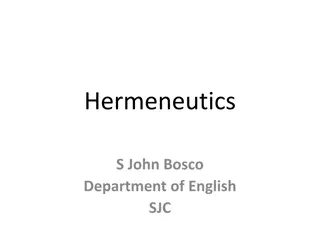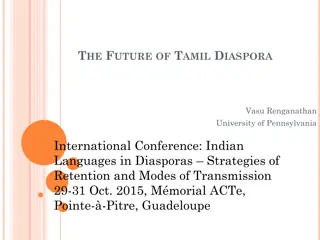Understanding the Role of Dogmas and Interpretation in Faith Heritage
The interpretation of faith heritage, apostolic teaching, and the role of dogmas in the Church form a foundation of belief that guides the spiritual journey. An authentic interpretation of God's Word is entrusted to the teaching office of the Church, emphasizing the connection between divine truths, dogmas, and the path to holiness. The faithful adhere to these truths through faith, supported by the Magisterium and guided by the hierarchy of dogmas. Faith grows through study, reflection, and unity in matters of faith and morals under the Church's guidance.
Download Presentation

Please find below an Image/Link to download the presentation.
The content on the website is provided AS IS for your information and personal use only. It may not be sold, licensed, or shared on other websites without obtaining consent from the author. Download presentation by click this link. If you encounter any issues during the download, it is possible that the publisher has removed the file from their server.
E N D
Presentation Transcript
Interpretation of the Interpretation of the Faith Heritage Faith Heritage The Apostolic Teaching The Apostolic Teaching
Giving an authentic interpretation of God's Word (written or Giving an authentic interpretation of God's Word (written or oral) belongs to the teaching office of the Church, that is, to oral) belongs to the teaching office of the Church, that is, to the bishops in communion with the Pope, who exercise their the bishops in communion with the Pope, who exercise their authority in Jesus' name. authority in Jesus' name. An Authentic Interpretation An Authentic Interpretation This Magisterium is not superior to God's Word, because the This Magisterium is not superior to God's Word, because the Church teaches what has been handed down by the Spirit, Church teaches what has been handed down by the Spirit, expounding God's Word from the single deposit of faith. expounding God's Word from the single deposit of faith.
Dogmas - Proposed Truths The dogmas of the Church are to be believed by faith alone. Please grant me the gift of faith,Lord, and allow me to appreciate the divine truths of your Church on earth. That dogma illuminates the path to holiness is a profound truth. Studying the dogmas more fully, will I hope grant me the grace to use the lessons they teach to improve my spiritual life. The hierarchy of the dogmas is not within my current knowledge, but I hope to read about them more diligently in order to comprehend their coherence. The Church proposes truths which are actually contained in or have a necessary connection with Divine Revelation. The faithful must adhere to these dogmas by faith. Dogmas and the spiritual life are connected because dogma illuminates the path of holiness. The person should welcome this light. All dogmas are connected and coherent. They have a "hierarchy" since they vary in their relationship to the Church's foundation.
Dogmas - Proposed Truths Your reflections: The Church proposes truths which are actually contained in or have a necessary connection with Divine Revelation. The faithful must adhere to these dogmas by faith. Dogmas and the spiritual life are connected because dogma illuminates the path of holiness. The person should welcome this light. All dogmas are connected and coherent. They have a "hierarchy" since they vary in their relationship to the Church's foundation.
The Inability to Err/ Ways of Growing in Faith The Inability to Err/ Ways of Growing in Faith Faith grows by the study of believers, by theological research, by reading the Scriptures and by preaching. Sacred Tradition, Sacred Scripture, and the Magisterium of the Church are so connected that one cannot stand without the others. All the faithful, anointed by the Spirit, can understand and reflect on these truths. When the bishops and the faithful, by their supernatural appreciation of faith manifest a universal consent in matters of faith or morals, the whole body of the faithful cannot err. The People of God, guided by Church's Magisterium, can adhere to these truths and apply them in daily living. I have been trying to study not just the truths of my faith, but the truths of other faiths as well, thinking to link them in terms of a common message. I m not sure how exactly the church itself is connected to Sacred Scripture and Tradition, it must be through the Magisterium of the Church. My Reflection: The anointment by the Spirit is crucial to understanding and the supernatural appreciation of faith. May I be guided to adhere to these truths and apply them.
The Inability to Err/ Ways of Growing in Faith The Inability to Err/ Ways of Growing in Faith All the faithful, anointed by the Spirit, can understand and reflect on these truths. When the bishops and the faithful, by their supernatural appreciation of faith manifest a universal consent in matters of faith or morals, the whole body of the faithful cannot err. The People of God, guided by Church's Magisterium, can adhere to these truths and apply them in daily living. Your Reflection: Faith grows by the study of believers, by theological research, by reading the Scriptures and by preaching. Sacred Tradition, Sacred Scripture, and the Magisterium of the Church are so connected that one cannot stand without the others. Your Reflection:
Just as the Lord Jesus took the nature of man, so God speaks to us in the words of men. Throughout Sacred Scripture, God speaks one Word which expresses himself completely. "One and the same Word of God extends throughout Scripture. One and the same utterance resounds in the mouths of all the sacred writers" (St. Augustine). Therefore, the Church venerates the Scripture as she does the Lord's Body. She feeds all the faithful from the one table of God's Word and Christ's Body. My reflection: I understand that God needs to speak to us in our own words, and I must believe that His word is the only thing that matters and that it is unchangeable. So, we as the faithful, need to venerate Scripture as we do Christ s Body. God Uses Words to Speak God Uses Words to Speak
Written by God Who Used Human Authors Written by God Who Used Human Authors God is the author of Sacred Scripture because it has been written under the guidance of the Holy Spirit. The Church accepts as sacred and canonical all of the books of the Old and New Testament, whole and entire, with all their parts. God chose and inspired certain men who used their own powers in writing. The Spirit showed them what he wanted written and no more. They were still true authors. Because all that the human author wrote was affirmed by the Spirit, these books teach faithfully and without error what God wanted to reveal for our salvation. Nevertheless, the Christian faith is not a "religion of the book" but of the living Word of God .
Written by God Who Used Human Authors Written by God Who Used Human Authors My reflection: Scripture is without error, but Christianity is not just a religion of the book, but of the Living Word of God. My Reflection: As the church accepts all the books of Scripture as sacred, so should my response be as well. Your Reflection: My reflection: The men who were inspired by the Spirit to write the word of God used their own powers of writing as well. Your Reflection: Your Reflection:
